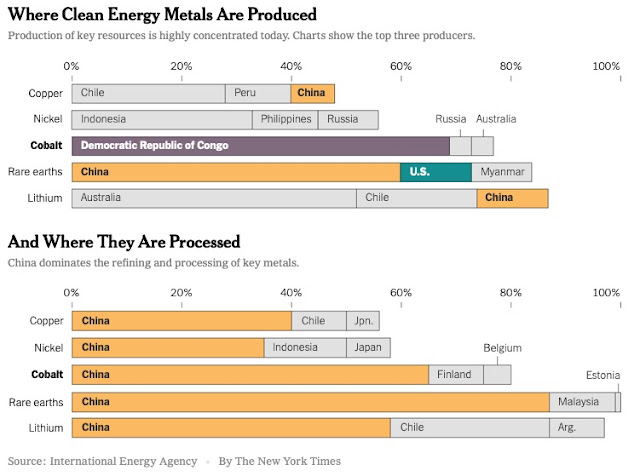First the Belgians, then the Americans & now the Chinese are taking the wealth from the Democratic Republic of Congo as de facto colonialism is an idea too powerful to ignore when it comes to money and power in the pursuit of raw resources, in this case cobalt, a material key to driving ever forward the development of new technologies in hopes of ameliorating the impact of global warming.
China’s pursuit of Congo’s cobalt wealth is part of a disciplined playbook that has given it an enormous head start over the United States in the race to dominate the electrification of the auto industry, long a key driver of the global economy.
But an investigation by The New York Times revealed a hidden history of the cobalt acquisitions in which the United States essentially surrendered the resources to China, failing to safeguard decades of diplomatic and financial investments in Congo. The sale of the two mines, also flush with copper, highlights the shifting geography and politics of the clean energy revolution, with countries rich in cobalt, lithium and other raw materials needed for batteries suddenly playing the role of oil giants.
The MIC's key to US ineptness regarding China tells volumes if one reads between the lines.
The loss of the mines happened under the watch of President Barack Obama, consumed with Afghanistan and the Islamic State, and President Donald J. Trump, a climate-change skeptic committed to fossil fuels and the electoral forces behind them. More broadly, it had roots in the end of the Cold War, according to previously classified documents and interviews with senior officials in the Clinton, Bush, Obama, Trump and Biden administrations.

Kisanfu is a new cobalt and copper mine being built by a Chinese conglomerate in the Democratic Republic of Congo.
For more than a decade, the vast expanse of untouched land was controlled by an American company. Now a Chinese mining conglomerate has bought it, and is racing to retrieve its buried treasure: millions of tons of cobalt.
At 73, Kyahile Mangi has lived here long enough to predict the path ahead. Once the blasting starts, the walls of mud-brick homes will crack. Chemicals will seep into the river where women do laundry and dishes while worrying about hippo attacks. Soon a manager from the mine will announce that everyone needs to be relocated.
“We know our ground is rich,” said Mr. Mangi, a village chief who also knows residents will share little of the mine’s wealth.
Raison d'été for cobalt ...
The gray metal, typically extracted from copper deposits, has historically been of secondary interest to miners. But demand is set to explode worldwide because it is used in electric-car batteries, helping them run longer without a charge.




No comments:
Post a Comment